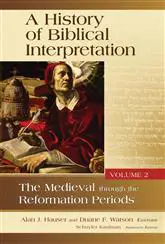

A History of Biblical Interpretation: Volume 2: The Medieval through the Reformation Periods
Pages
558
Publisher
Eerdmans
Published
11/10/2009
ISBN-13
9780802842749
A blended presentation of a broad spectrum of biblical interpretation from different traditions
A History of Biblical Interpretation provides detailed and extensive studies of the interpretation of the Scriptures by Jewish and Christian writers throughout the ages. Written by internationally renowned scholars, this multivolume work comprehensively treats the many different methods of interpretation, the many important interpreters from various eras, and the many key issues that have surfaced repeatedly over the long course of biblical interpretation.
This second installment contains essays by fifteen noted scholars discussing major methods, movements, and interpreters in the Jewish and Christian communities from the beginning of the Middle Ages until the end of the sixteenth-century Reformation.
The authors examine such themes as the variety of interpretive developments within Judaism during this period, the monumental work of Rashi and his followers, the achievements of the Carolingian era, and the later scholastic developments within the universities, beginning in the twelfth century. Included are bibliographical references for even deeper study.
A History of Biblical Interpretation provides detailed and extensive studies of the interpretation of the Scriptures by Jewish and Christian writers throughout the ages. Written by internationally renowned scholars, this multivolume work comprehensively treats the many different methods of interpretation, the many important interpreters from various eras, and the many key issues that have surfaced repeatedly over the long course of biblical interpretation.
This second installment contains essays by fifteen noted scholars discussing major methods, movements, and interpreters in the Jewish and Christian communities from the beginning of the Middle Ages until the end of the sixteenth-century Reformation.
The authors examine such themes as the variety of interpretive developments within Judaism during this period, the monumental work of Rashi and his followers, the achievements of the Carolingian era, and the later scholastic developments within the universities, beginning in the twelfth century. Included are bibliographical references for even deeper study.